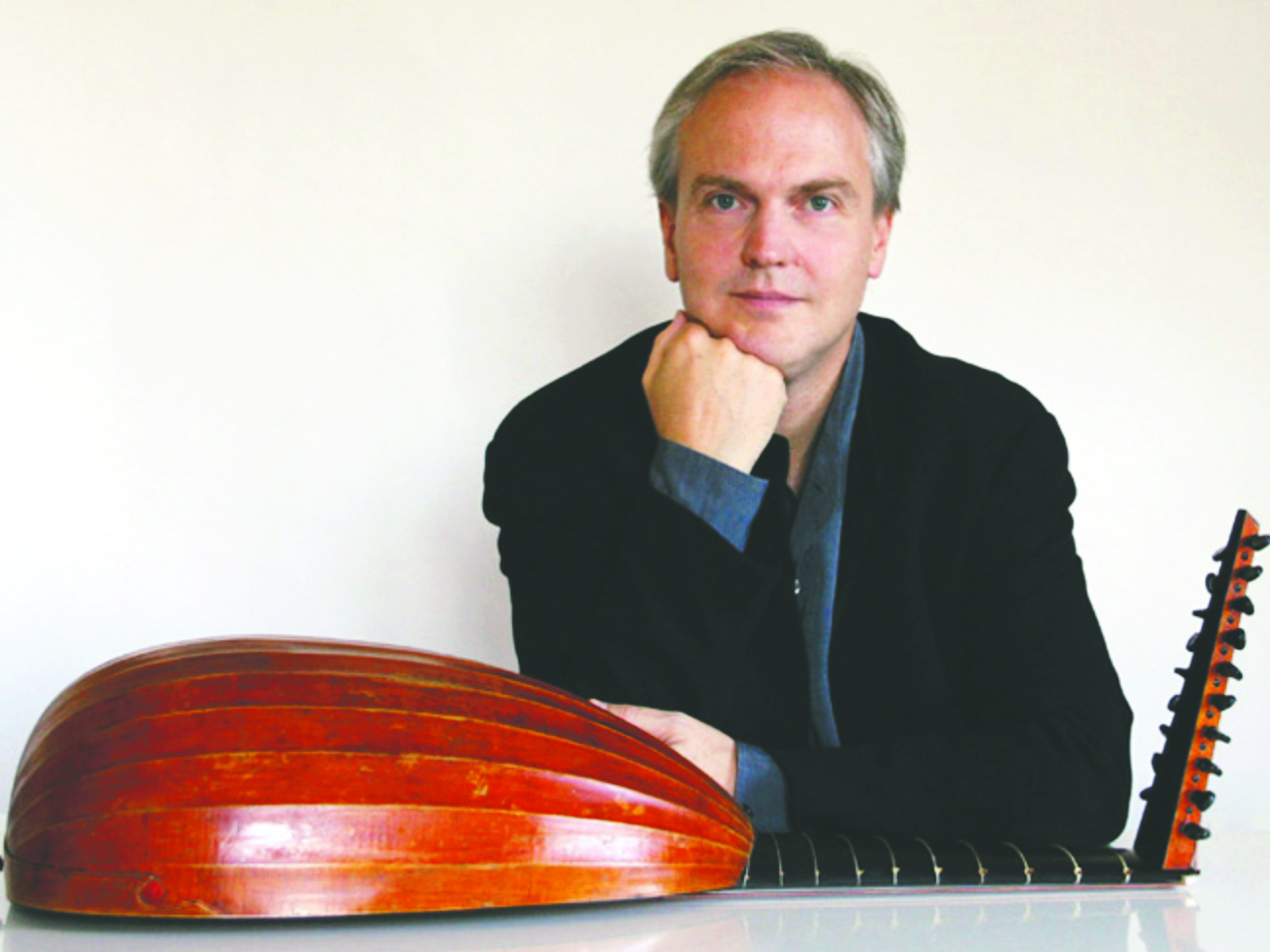
YaleInstituteofSacredMusic
Renowned lutenist Jakob Lindberg and faculty vocalist James Taylor performed 23 works from the 16th to 20th centuries by nine composers at a joint recital titled “Sweet Sighs” in the Marquand Chapel Saturday evening. The composers included Giulio Caccini, John Dowland and Etienne Moulinié.
The night’s event, sponsored by the Yale Institute of Sacred Music and held at the edge of the Sterling Divinity Quadrangle, included songs and lute solos from Italy, England and France. Lindberg, a professor of lute at the Royal College of Music in London, is one of the most prominent lutenists in the world today, especially acclaimed in the fields of Renaissance and Baroque music. Taylor, a prolific Bach tenor, oratorio specialist and professor at the School of Music, sang in tandem with Lindberg’s lute playing.
“It’s rare that you see a lute player with such technical proficiency and that can play pieces like that so convincingly,” said Nate Huvard MUS ’19. “A lot of people might try to play that kind of music and the intent doesn’t come across as well.”
For Huvard, attending “Sweet Sighs” was well worth his time. As a guitar and lute player himself, he was particularly impressed by Lindberg’s performance. Huvard characterized Lindberg as “one of the best players in the world.” But it wasn’t only Lindberg’s performance that made the night for Huvard. The impressive interplay between the two top-notch musicians also caught his attention — the way they followed each other’s phrasings in a manner that was fluid, effortless and “not so carved in stone,” Huvard said.
What’s more, Lindberg and Taylor were able to establish this dynamic in less than a week; after Taylor arrived on campus last Sunday, the pair rehearsed several hours each day until the performance. On top of that, the lutenist worked extensively with many of Taylor’s students, accompanying and coaching them on mainly 16th-century songs so they could get a sense of how it felt to work with the lute, to sing and match the sounds of an instrument quite different from the piano.
In many ways, “Sweet Sighs” helped Taylor step out of his comfort zone in choosing a repertoire that he had largely never sung before. He also wanted Lindberg to help him understand and interpret some pieces new to him: namely, French songs from the time of King Louis XIII.
“As you can imagine, [singing with a lute] is much more delicate and it takes great restraint because, especially today, in the 21st century, we singers are trying to learn to be heard over orchestras, possibly in huge concert halls,” Taylor said. “So it’s quite something to be asked to do just the opposite of what we tend to do.”
Lindberg has visited Yale previously. He played the lute in 2011 in Sprague Memorial Hall alongside Emma Kirkby, a renowned English soprano and early music specialist. The pair carried out a similar agenda in 2015, when it delivered a recital in Marquand Chapel before performing four days later in Carnegie Hall. In both years, the two held classes for Taylor’s students.
Drake Duffer MUS ’19 said the choice to hold “Sweet Sighs” in the Marquand Chapel was well-founded. He said he was pleased that music written for a compact space with a high-vaulted ceiling, such as Marquand Chapel, was being played there.
“It’s utilizing a different space to the strengths of the music,” Duffer said, noting that the lute is much softer than many other instruments. “The other [recitals] have been in Woolsey or Sprague, but they’ve also been the sort of music that were written for that space.”
Duffer, who plays guitar, also found Lindberg’s commitment to his instrument to be especially compelling. He said that while many classical guitarists play early music with the lute or theorbo, they do not make it a priority to do so, and seeing Lindberg perform early music with the lute as his life’s work was “incredible.”
Lindberg’s talent and passion especially shone through during his solo performance of Benjamin Britten’s “Nocturnal after John Dowland, Op. 70” immediately after the intermission. According to Lindberg, the widely influential piece was originally written in 1963 for virtuoso classical guitarist Julian Bream. However, Lindberg took it upon himself to perform it on the lute. He mastered the guitar arrangement easily, but wanted to craft his own arrangement for his instrument. To do so, he reached out to the Britten estate to obtain a first draft of the piece with the composer’s original annotations and obtained permission from Faber Music.
Taylor, too, put his heart into the recital. He loved every single work the two performed, finding each of them to be “all very, very special.” He did, however, particularly enjoy the last few pieces. He described Henry Purcell’s “What a sad fate, Z. 428” as a “stunning, compelling, mesmerizing piece of music,” and “Urge me no more, Z.426” as “chromatic, tortured and descriptive.”
Audience members likely experienced similar emotions as they witnessed the two sought-after musicians perform in an intimate setting. An extended standing ovation at the end of the program brought Lindberg and Taylor back to the stage, where they performed a rendition of Elvis Presley’s “Love Me Tender,” returning listeners to a more modern day and drawing the night to a sweet and sentimental close.
Lindberg and Taylor will hold a recital of the same name at Princeton University at 8:00 p.m.
Alan Liu | alan.s.liu@yale.edu







